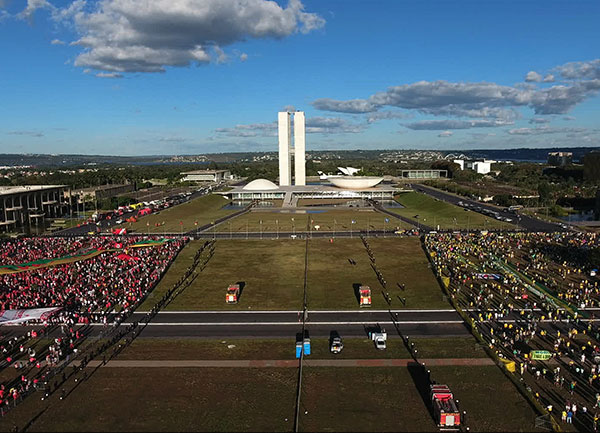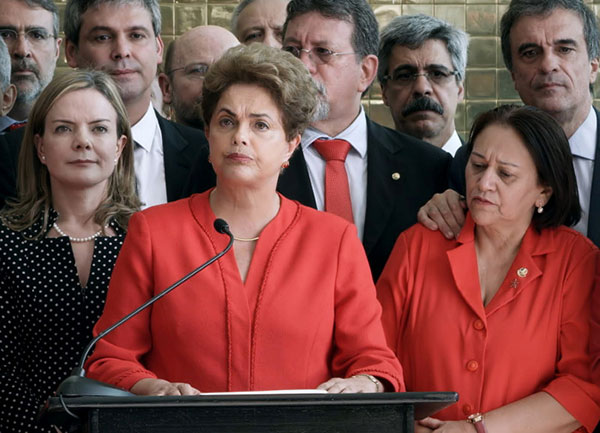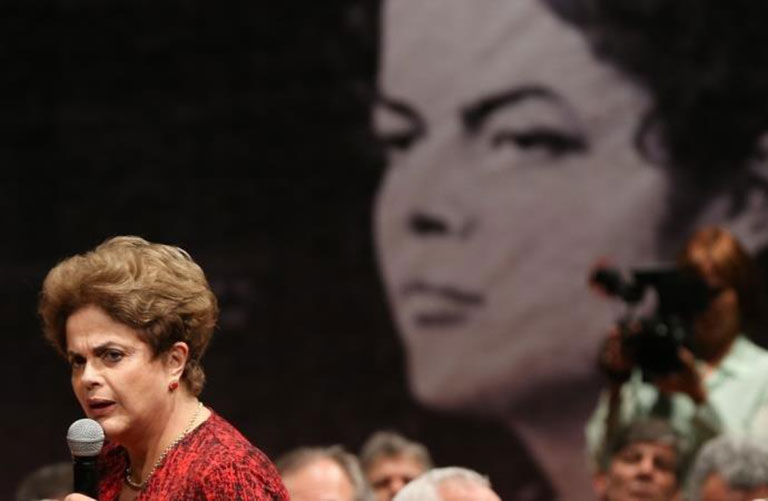Maria Augusta Ramos' O Processo (The Trial) may be that rare instance of a documentary too methodical for its own good. It's a riveting blow-by-blow account of the impeachment of Brazilian president Dilma Rousseff, who came under fire from the right wing of that country's congress after accusations of money laundering, raised by her political enemies – most explicitly, Judge Sérgio Moro, who would successfully prosecute former president Lula Ignacio de Silva – once the most popular politician in the country – as well. (He's currently serving a 12-year prison sentence.) Corruption is widespread on both sides of the political divide, however; in June, The Intercept released leaked chats between Moro and prosecutors confirming that the investigations were timed to prevent Lula from running again in the 2018 election.
Famously, Rousseff had been a left-wing guerrilla during the dictatorship in Brazil, and suffered torture. Her impeachment – championed by none other than now-president Jair Bolsonaro, who dedicated his vote against Rousseff to Colonel Carlos Brilhante Ustra, one of the worst torturers during Brazil's dictatorship – is widely acknowledged as politically motivated, and some of the same prosecutors have since been investigated or imprisoned themselves. After seeing the film at the 2018 Berlinale, I anxiously awaited word of U.S. distribution; this Sunday it plays at Spectacle Theater (where, full disclosure, I'm a volunteer) followed by a Skype Q&A with Ramos.
To open with a broad question… Tell me about how you structured 450 hours of raw material into something that feels - or rather, is - a courtroom drama…
I’m not somebody who accumulates tons of footage and waits until the editing to decide what the structure of the film will be. In this case I did no research or pre-production: I went to Brasilia without knowing any of the people who would appear in the film and trying to get authorization. I shot a lot that I just decided not to use. Once it became clear the film was about the judicial political process in the Senate, I chose to follow “characters” on Rousseff’s legal team. I had to shoot a lot because these committees and meetings take forever. I couldn’t interfere, nobody knew what was gonna happen, or when. I had to shoot 450 hours and it took me and my editor Karen Akerman almost six months to cut the movie.
But you were working very quickly, because the situation evolved rapidly and continued to evolve…
It was important to finish the film quickly. We premiered in Berlin in February 2018, and it was released in Brazilian cinemas that May. It did quite well - even though it’s long, and not a feel-good film, it may have been cathartic for progressives to see. I try for my documentaries to have a beginning, a middle and an end. I don’t want to spend years and years editing a film - for financial reasons, but also structural.
Do you consider yourself a journalist?
No. Uh-uh. I’m documenting things but I’m not a journalist at all. I’m really a filmmaker, a documentary maker.
In Film Quarterly you told Nilo Couret you had no restrictions on access to the defense team. Had this been agreed on before you arrived in Brasilia?
No.
Did you have strategies in mind, in the event people blocked you from shooting specific things?
I had no idea what was going to happen. I went there ten, maybe eight days, before the first vote in the Chamber of Deputies, which became the prologue of the film. I really didn’t know if I would even get authorization to enter the building. What I had was an introduction to some Deputies from the left, who were against the impeachment obviously. The reason why they opened up to me was because of my three prior films, about the justice system in Brazil - they’re quite known here, especially Justice (2004) and Behave (2007) - among lawyers and legal professors. All the legal advisors knew my films, used them when teaching at universities, and so on - that helped.
I also wanted to have access to the conservatives (on the right and center right parties) - the senators pushing for the impeachment. I did ask them. They wouldn’t allow it, because they were not interested in sharing their strategies - they didn’t want to be transparent about their reasons for what they did. You can imagine.

The impeachment process was a huge story obviously. Within Brazil, can you give me a sense of the breakdown between left and right-wing news coverage?
A regular person could not understand the real reasons President Dilma was being impeached, because the corporate media distorted the facts so much. They repeated over and over again: “Corruption”, the pedaladas, whereby she allegedly delayed repayment of farm subsidies... The outrage was manufactured by the media and they kept feeding it to the public. It was completely Kafkaesque. I believe this mechanism, the distortion of the facts, in short, the farce is revealed in the film. To watch the film now, six months into Bolsonaro’s presidency, I can see so many things that were hidden at the time. After he dedicated his vote to Coronel Brilhante Ustra, he actually had to be expelled from Congress - but really, nothing happened. That was the beginning of the end, you see? Words have profound consequences. The fact that he paid homage to such a man, and nothing happened - makes it okay for politicians to say racist or homophobic things, it makes it okay for them to defend the dictatorship even torture. It legitimates violence and vigilantism.
And of course the defense is always “They’re just words”.
Right. And now Marielle Franco, the city councillor from Rio de Janeiro, an active champion of people living in the favelas, of reproductive and LGBTQ rights - she’s been assassinated. Brazil’s first gay-rights activist to serve in congress, Jean Wyllys had to abdicate his position and leave the country. Many left-wing intellectuals and gay rights activists have fled the country. Young black men in the favelas are being killed.
You told me before that Bolsonaro has used footage from the film on Twitter, illegally. Can you explain?
You remember towards the end of The Trial, the leadership of the Workers’ Party have this meeting, and Gilberto Carvalho, a former Lula Minister, reflects and says: “We also made mistakes. We have to do some self criticism.” He gave some examples of things he wished they had done differently while in power. Bolsonaro tweeted a clip from that scene as if it was something that had leaked or had been done in secret - when it was a public conference. He used the fragment illegally and took it out of context - it wasn’t a closed-doors meeting. It’s from my film.
Since coming into office, Bolsonaro has been destroying everything that was built during the Lula government. It’s been a complete disaster: he’s a homophobe, a racist, against the poor and minorities. He is using all the same strategies Trump uses. He creates this chaos spreading fake news and lies all over the internet. While the whole civil society is just caught into this very distorted reality - he and his government succeed in adopting all sorts of neoliberal policies, cutting public spending in education, health, extinguishing culture ministries, creating censorship, persecuting journalists, cutting workers’ rights.
He’s a proud fascist.
He is. If there’s one thing that the Europeans and Americans are worried about, it’s the Amazon; you can be sure that he’s a huge danger to the rainforest. The deforestation is going on at an incredible rate since he came into power. The forest is burning.
He’s also threatened the Brazilian Central Film Fund, which is fundamental to the movies getting made in Brazil, as I understand it.
He wants to get rid of it entirely. He wants to get rid of anybody’s ability to voice criticism, anywhere - journalists, artists, politicians, etc. He said he would do that - we don’t know what’s gonna happen but for sure, things will change in many ways. The agency will probably be forced to support more entertaining films, less critical films about the political situation… The industry is trying to do its best to avoid it by talking to congress - of course congress has to agree to his cuts - but the Social Liberal Party has a majority right now. It’s very bad right now. You know how The Intercept has revealed a series of phone calls and WhatsApp messages between Justice Minister Sérgio Moro, the former Judge who condemned Lula, and the prosecutors of “Operation Car Wash”… It’s a huge, corrupt scandal! It is an amazing and courageous piece of investigative journalism by Glenn Greenwald, Leandro Demori and a team of Brazilian journalists at The Intercept Brazil. Just yesterday I filmed a rally organized by the press association in defense of Glenn Greenwald because Bolsonaro and Moro are publicly threatening to imprison Glenn.
When I first saw the film, his testimony against Rousseff was the most egregious - it made headlines here too - but my sense is that nobody could have known he would be president less than a year later. He seemed like a fringe figure…
Nobody could dream of it - nobody. Not in parliament. It is a nightmare come true. When I was making the film, and when it premiered at the Berlinale, the notion was absurd. He’s mediocre, incompetent, racist, an apologist for the dictatorship… It wasn’t being considered by any serious politician on any side. Other names were considered, including Lula - the idea he could mount a return - he had almost 50% approval rating even after he was condemned by ex-jugde and current Justice Minister Sérgio Moro. He could have won the election. But he was imprisoned, unjustly. nobody was considering the Bolsonaro presidency, nobody believed it would happen. Which is also like Trump. “He’s never gonna win!” I think the Bolsonaro case is even worse because he really is weakening the democratic institutions, and creating political, economical, and social chaos … We are still very much in shock, obviously.
What’s interesting to me - and sort of comparable to the crusade against Hillary Clinton, here - is the ability of a blatantly corrupt political party to harness anti-corruption as a populist issue. The scenes of people partying in the streets in support of Rousseff’s impeachment are quite chilling. Have they been brainwashed?
They have. The impeachment was the starting point, basically - we have this absolutely right-wing, conservative corporate media, that has been demonizing the workers’ party on the left, for years. It’s happening daily, in people’s minds. Corruption, as a justification, goes back to Nazi Germany, goes back to the dictatorship in 1964, to justify radical measures against civil society, against journalists, against progressive or left wing governments. Authoritarian regimes always pretend to be "anti-corruption”.
If you look at the impeachment, it’s even more absurd now that it has been revealed how corrupt the prosecutors of the Car Wash investigation, the Justice Minister, the Bolsonaro people are. The corruption of the ‘anti-corruption’ conservative establishment. It’s completely absurd. Many corrupt senators and deputies voted for the impeachment of Rousseff, an honest politician. We are living in a constitutional crisis. I think in the world - not just in Brazil, but also with the rise of the extreme right in Europe - Boris Johnson in Britain, Victor Orban, Matteo Salvini in Italy - we’re going through a dark phase in the world. Capitalism is going through a huge destruction period.

Why do you think?
I’m not an economist. My humble opinion is that the elites want to carry on earning a huge amount of money at the cost of the workers, the environment, the middle class even.
The era of the welfare state, capitalism with a human face, solidarity is over.
When you began making this film, did you think the proceedings would be successful?
No. I didn’t. A lot of us on the left thought it would fail - at least the first part, in the Chamber of Deputies, a lot of progressives assumed it couldn’t happen. And then it did. It went to the Senate and I said, “Okay, that’s it - they’re going to do it.”
How did this realization influence your decisions as a filmmaker? Watching the movie now, you know the outcome (or at least the broad outlines of what happened), but you’ve also structured it as a slow realization that the impeachment is getting likelier and likelier…
Of course when you’re shooting you have to keep an open mind in every way. To be able to see and listen and portray reality in a complex way, with its different narratives - it’s important not to lose your curiosity. We tried to maintain that in the editing, to create dramatic tension, and it was there during the Senate session. Although in many ways the Senators defending the President knew it would be very hard to win, they saw themselves as struggling to regain a narrative, to win - so future generations would know the impeachment was a farce. To me this is very moving, very inspiring.. And in the editing I tried to keep that hope.



